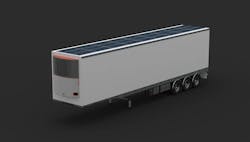Sunswap debuts zero-emission TRU
Cleantech startup Sunswap recently launched its first-generation zero-emission transport refrigeration unit (TRU).
Sunswap, based in London, England, is building new technology to create zero-emission transport refrigeration products that reduce noise and air pollution. The majority of TRUs, commonly used by all supermarkets, rely on an auxiliary diesel engine to provide power for cooling. The launch of this product marks a key milestone on the journey to see zero-emission TRUs as standard practice to deliver groceries and frozen goods, the company maintained.
“I am very proud that Sunswap is already in the position to launch our first-generation, zero-emission transport refrigeration unit,” said Nikolai Tauber, Sunswap’s chief technology officer. “Reaching this milestone is an important moment in the Sunswap development roadmap and a significant leap in terms of how we can support industry to transition to zero-emission technology.
“With Sunswap’s engineering team expanding in the next few months, we are accelerating the product launch of our next-generation system and look forward to unveiling our technology on UK roads next year.”
At the core of the product is the patent-pending Adaptive Battery Capacity, which offers a modular approach to on-board energy storage, enabling customers to only pay for the battery capacity they need. Up to 50% of the energy needed for most journeys is provided by solar panels mounted on the trailer roof, reducing grid infrastructure upgrades.
Through recent technology advancements, Sunswap claims it will be the first company to deliver a flagship TRU with an ultra-low Global Warming Potential refrigerant. Additionally, the Sunswap TRU will have a lower operating cost than the existing diesel alternative, which will be further exacerbated in April 2022 when the red diesel subsidy on TRUs is removed in the United Kingdom, increasing fuel costs by 70%.
The product launch follows a busy year during which Sunswap established partnerships with government, academic and research organizations, including Imperial College London. The team expanded and is working on developing the technology further, with the intention of launching the TRU with a refrigerated fleet operator in 2021.

